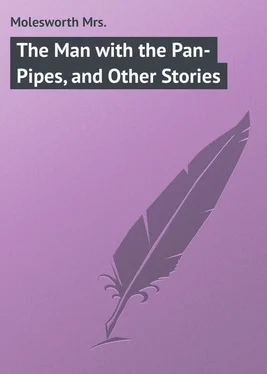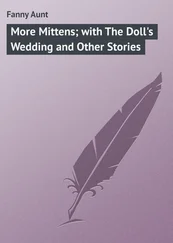Mrs. Molesworth - The Man with the Pan-Pipes, and Other Stories
Здесь есть возможность читать онлайн «Mrs. Molesworth - The Man with the Pan-Pipes, and Other Stories» — ознакомительный отрывок электронной книги совершенно бесплатно, а после прочтения отрывка купить полную версию. В некоторых случаях можно слушать аудио, скачать через торрент в формате fb2 и присутствует краткое содержание. Жанр: foreign_prose, foreign_children, на английском языке. Описание произведения, (предисловие) а так же отзывы посетителей доступны на портале библиотеки ЛибКат.
- Название:The Man with the Pan-Pipes, and Other Stories
- Автор:
- Жанр:
- Год:неизвестен
- ISBN:нет данных
- Рейтинг книги:5 / 5. Голосов: 1
-
Избранное:Добавить в избранное
- Отзывы:
-
Ваша оценка:
- 100
- 1
- 2
- 3
- 4
- 5
The Man with the Pan-Pipes, and Other Stories: краткое содержание, описание и аннотация
Предлагаем к чтению аннотацию, описание, краткое содержание или предисловие (зависит от того, что написал сам автор книги «The Man with the Pan-Pipes, and Other Stories»). Если вы не нашли необходимую информацию о книге — напишите в комментариях, мы постараемся отыскать её.
The Man with the Pan-Pipes, and Other Stories — читать онлайн ознакомительный отрывок
Ниже представлен текст книги, разбитый по страницам. Система сохранения места последней прочитанной страницы, позволяет с удобством читать онлайн бесплатно книгу «The Man with the Pan-Pipes, and Other Stories», без необходимости каждый раз заново искать на чём Вы остановились. Поставьте закладку, и сможете в любой момент перейти на страницу, на которой закончили чтение.
Интервал:
Закладка:
Molesworth Mrs.
The Man with the Pan-Pipes, and Other Stories
The Man with the Pan-Pipes
CHAPTER I
WhenI was a little girl, which is now a good many years ago, there came to spend some time with us a cousin who had been brought up in Germany. She was almost grown-up – to me, a child of six or seven, she seemed quite grown-up; in reality, she was, I suppose, about fifteen or sixteen. She was a bright, kind, good-natured girl, very anxious to please and amuse her little English cousins, especially me, as I was the only girl. But she had not had much to do with small children; above all, delicate children, and she was so strong and hearty herself that she did not understand anything about nervous fears and fancies. I think I was rather delicate, at least, I was very fanciful; and as I was quiet and gave very little trouble, nobody noticed how constantly I was reading, generally in a corner by myself. I now see that I read far too many stories, for even of good and harmless things it is possible to have too much. In those days, fortunately for me, there were not nearly so many books for children, so, as I read very fast, I was often obliged to read the same stories over and over again. This was much better for me than always getting new tales and galloping through them, as I see many children do now-a-days, but still I think I lived too much in story-book world, and it was well for me when other things forced me to become more, what is called, "practical."
My cousin Meta was full of life and activity, and after awhile she grew tired of always finding me buried in my books.
"It isn't good for you, Addie," she said. "Such a dot as you are, to be always poking about in a corner reading."
She was quite right, and when mamma's attention was drawn to it she agreed with Meta, and I was given some pretty fancy-work to do and some new dolls to dress, and, above all, I was made to play about in the garden a good deal more. It was not much of a garden, for our home was then in a town, still it was better than being indoors. And very often when kind Meta saw me looking rather forlorn, for I got quickly tired with outdoor games, she would come and sit with me in the arbour, or walk about – up and down a long gravel path there was – telling me stories.
That was her great charm for me. She was really splendid at telling stories. And as hitherto she had only done me good, and mamma knew what a sensible girl she was, Meta was left free to tell me what stories she chose. They were all nice stories, most of them very interesting. But some were rather too exciting for such a tiny mite as I was. Meta had read and heard quantities of German fairy-tales and legends, many of which I think had not then been printed in books – certainly not in English books. For since I have been grown-up I have come across several stories of the kind which seemed new to most readers, though I remember my cousin telling them to me long, long ago.
There were wonderful tales of gnomes and kobolds, of the strange adventures of the charcoal-burners in lonely forests, of water-sprites and dwarfs. But none of all these made quite as great an impression on me as one which Meta called "The Man with the Pan-pipes," a story which, much to my surprise, I found years after in a well-known poem called "The Pied Piper of Hamelin." It was the very same story as to the facts, with just a few differences; for instance, the man in the poem is not described as playing on pan-pipes , but on some other kind of pipe. But though it is really the same, it seems quite, quite different from the story as I heard it long ago. In the poem there is a wonderful brightness and liveliness, and now and then even fun, which were all absent in Meta's tale. As she told it, it was strangely dark and mysterious. I shall never forget how I used to shiver when she came to the second visit of the piper, and described how the children slowly and unwillingly followed him – how he used to turn round now and then with a glance in his grim face which made the squeal of the pipes still more unearthly. There was no beauty in his music, no dancing steps were the children's whom he dragged along by his power; "they just had to go," Meta would say. And when she came to the mysterious ending, my questions were always the same.
"Are they still there – shut up in the cave?" I would ask.
Meta supposed so.
"Will they never come out – never, never?" I said.
She shook her head.
"And if they ever did," I said, "would they be grown-up people, or quite old like – like that man you were telling me about. Rip – Rip – "
"Rip van Winkle," she said.
"Yes, like Rip van Winkle, or would they have stayed children like the boy the fairies took inside the hill to be their servant?"
Meta considered.
"I almost think ," she said, seriously, "they would have stayed children. But, of course, it's only a story, Addie. I don't suppose it's true. You take things up so. Don't go on puzzling about it."
I would leave off speaking about it for the time; I was so dreadfully afraid of her saying she would not tell it me again. And even though I knew it quite well, and could correct Meta if ever she made any part of it the least different, I was never tired of hearing the story. I would ask for it over and over again, and I used to have exactly the same feelings each time she told it, and always at the part where the children began to come out of their houses, some leaving their dinners, some tiny ones waking up out of their sleep, some only half-dressed, but all with the same strange look on their faces, I used to catch hold of Meta's hand and say to her, "Hold me fast, I'm so afraid of fancying I hear him," and then she would burst out laughing at me, and I would laugh at myself. For she was far too kind a girl to think of frightening me, and, indeed, except for a curious "coincidence" – to use a very long word which means something of the same kind as another thing happening at or about the same time – I do not think the story would have really taken hold of my fancy as it did.
One of my questions Meta was not able for some time to answer to my satisfaction.
"What are Pan-pipes?" I asked. The word "pipe" was so mixed up in my mind with white clay pipes, out of which we used to blow soap bubbles, that I could not understand it having to do with any kind of music.
"Oh," said Meta, "they're made of reeds, you know, all in a row like this," and she held up her fingers to her lips, "and you play them by whistling along them, do you see? It sounds something like when you fasten tissue-paper on a comb and blow along it. And they're called 'Pan'-pipes because – oh, I forgot, of course you haven't learnt mythology yet – 'Pan' was one of the old pagan gods, a sort of fairy or wood sprite, you know, Addie, and the pictures and figures of him always show him playing on these reed pipes!"
I said "Yes," but I didn't really understand her description. It left a queer jumble in my head, and added to the strange, dreamy medley already there. But, though it was not till years afterwards that I learnt about "Pan," before Meta left us I was able to see for myself a set of his "pipes."
CHAPTER II
ITwas just before my merry cousin left us, to return to her own home across the sea.
One day several of us were out walking together. Meta was in front with mamma and one of my elder brothers, I was behind with Tony and Michael, the two nearer my own age. Suddenly Meta glanced round.
"Look, Addie," she called back, "there's a set of Pan-pipes; you wanted to know what they were like. They're a very doleful set, certainly; did you ever see such a miserable object? He must be silly in his head, poor thing, don't you think, aunty? May I give him a penny – or Jack will."
Читать дальшеИнтервал:
Закладка:
Похожие книги на «The Man with the Pan-Pipes, and Other Stories»
Представляем Вашему вниманию похожие книги на «The Man with the Pan-Pipes, and Other Stories» списком для выбора. Мы отобрали схожую по названию и смыслу литературу в надежде предоставить читателям больше вариантов отыскать новые, интересные, ещё непрочитанные произведения.
Обсуждение, отзывы о книге «The Man with the Pan-Pipes, and Other Stories» и просто собственные мнения читателей. Оставьте ваши комментарии, напишите, что Вы думаете о произведении, его смысле или главных героях. Укажите что конкретно понравилось, а что нет, и почему Вы так считаете.












